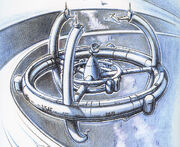m (lk fix) |
m (→Background: t) |
||
| Line 62: | Line 62: | ||
When asked about what would pass for science fiction in the 24th century, [[Ronald D. Moore]] replied: |
When asked about what would pass for science fiction in the 24th century, [[Ronald D. Moore]] replied: |
||
| − | :''"It's a notion that's come up from time to time in our discussions. The problem is that we're already pushing the envelope of what's scientifically believable in the 24th century. Trying to come up with what these characters would dream of in their own science fiction constructs is extremely difficult if not impossible."'' |
+ | :''"It's a notion that's come up from time to time in our discussions. The problem is that we're already pushing the envelope of what's scientifically believable in the 24th century. Trying to come up with what these characters would dream of in their own science fiction constructs is extremely difficult if not impossible."'' {{AOLchat|Ronald D. Moore|ron52|1997}} |
[[Category:Earth literature]] |
[[Category:Earth literature]] |
||
Revision as of 07:42, 17 August 2009

Concept art for the novella "Deep Space Nine"
Science fiction is a story-telling medium or genre in which a quasi-scientific background is often intricate to the fiction itself. Science fiction continues to be a form of entertainment in the 24th century.
Some notable developments of Earth science were predicted by fiction writers in earlier centuries, such as space travel and time travel.
In a vision sent to him by the Prophets and the Pah-wraiths, Benjamin Sisko was Benny Russell, a struggling, African-American science fiction writer for Incredible Tales magazine. In the vision, Russell was responsible for creating the story of Deep Space 9 and Sisko had been known to consider the possibility that his 'vision' was in fact reality and his own life was merely a work of fiction. Sisko's father found such a view disturbing. (DS9: "Far Beyond the Stars")
Science fiction media
Films
- The Andromeda Strain
- The Bride of Chaotica
- The Day the Earth Stood Still
- Night of the Killer Androids
- The Underworld Aliens
Holonovels
Novels
- The Puppet Masters by Robert Heinlein
- Twenty Thousand Leagues Under the Sea by Jules Verne
- The War of the Worlds by H.G. Wells
Short Stories
- "1001: First Odyssey" by Albert Macklin
- "Assault on Planet 10" by K.C. Hunter and Julius Eaton
- "The Cage" by E.W. Roddenberry
- "The Corbomite Maneuver" by Jerry Sohl
- "Dad's Revenge" by Olivia Eaves and Alicia Eaves
- "The Dogs Themselves" by Albert Macklin
- "Far Beyond the Stars" by Benny Russell
- "Federation and Empire" by Albert Macklin
- "From the Moon to the Earth" by Hugh Campbell
- "Hazardous Images" by Herbert Rossoff
- "I Have No Voice So I Must Shout" by Herbert Rossoff
- "Journey to Babel" by D.C. Fontana
- "Loner in a Lonely World" by Hugh Campbell
- "Lucifer's Chainsaw" by K.C. Hunter and Julius Eaton
- "Me, Android" by Albert Macklin
- "Metamorphosis" by Gene L. Coon
- "A Most Fortunate Accident" by Olivia Eaves and Alicia Eaves
- "Quantity of the Monster" by Herbert Rossoff
- "Questor" by E.W. Roddenberry
- "Solar Odyssey" by Benny Russell
- "Space Mutant"
- "Strange Martian"
- "Third Foundation" by Albert Macklin
- "This Island Mars" by Benny Russell
- "Venusian Chronicles" by Hugh Campbell
- "Voyage into the Atom"
- "Where No Man Has Gone Before" by Samuel Peeples
- "A Wrinkle in Space" by K.C. Hunter and Julius Eaton
Television
See also
- Science fiction references in Star Trek
Background
Star Trek itself is considered science fiction. The milieu of Star Trek has often been a predictor of technological trends, and has been studied by modern engineers looking for new applications for designs. The biobed from TOS became a reality a few decades after being shown when medical sensors were added to hospital beds and computer readouts, and the layout of the bridge has been studied by the military for use as an actual command center.
When asked about what would pass for science fiction in the 24th century, Ronald D. Moore replied:
- "It's a notion that's come up from time to time in our discussions. The problem is that we're already pushing the envelope of what's scientifically believable in the 24th century. Trying to come up with what these characters would dream of in their own science fiction constructs is extremely difficult if not impossible." (AOL chat, 1997)
